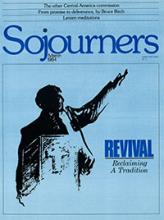When we entered the camp, he was the first one who caught my eye. He was only a boy, but he was carrying an automatic rifle over his shoulder. He was shy, but very curious about our group. Wherever we went, he followed a short way behind. I found myself looking back over my shoulder again and again. Whenever my eyes caught his, he would smile. He stayed with us as we were led around the camp.
We were in the La Estancia refugee settlement near Jalapa, Nicaragua. The boy is part of the citizen militia which is trying to defend the people of Nicaragua's northern frontier from terrorist attacks led by the contras, the mercenary army backed by the United States government.
I knew that the militia includes many children as well as 80-year-olds. And I'd even seen kids with guns before, in the inner city of Washington, D.C. But he really captured my attention.
I am deeply committed to nonviolence. And to see a little kid with a rifle on his shoulder was very hard. He looked so frail and vulnerable to me. I just wanted to pick him up and tell him it's going to be okay. But it's not okay, so he has to carry a gun.
I wanted to talk to him, so I hung back a little from the group and waited for him to catch up. A priest translated for me as I asked him some questions.
I introduced myself and asked him his name. "My name is Agenor."
"How old are you?"
"I'm 13 years old." He went on to tell me that he lives in the settlement there with his family. He's one of six children. He said he had been in the militia only for a little while and that he was on the night watch.
"Do you carry the gun all the time?" I asked him.
"Every day," he replied.
"How do you feel about carrying such a heavy gun all day long?"
Read the Full Article

